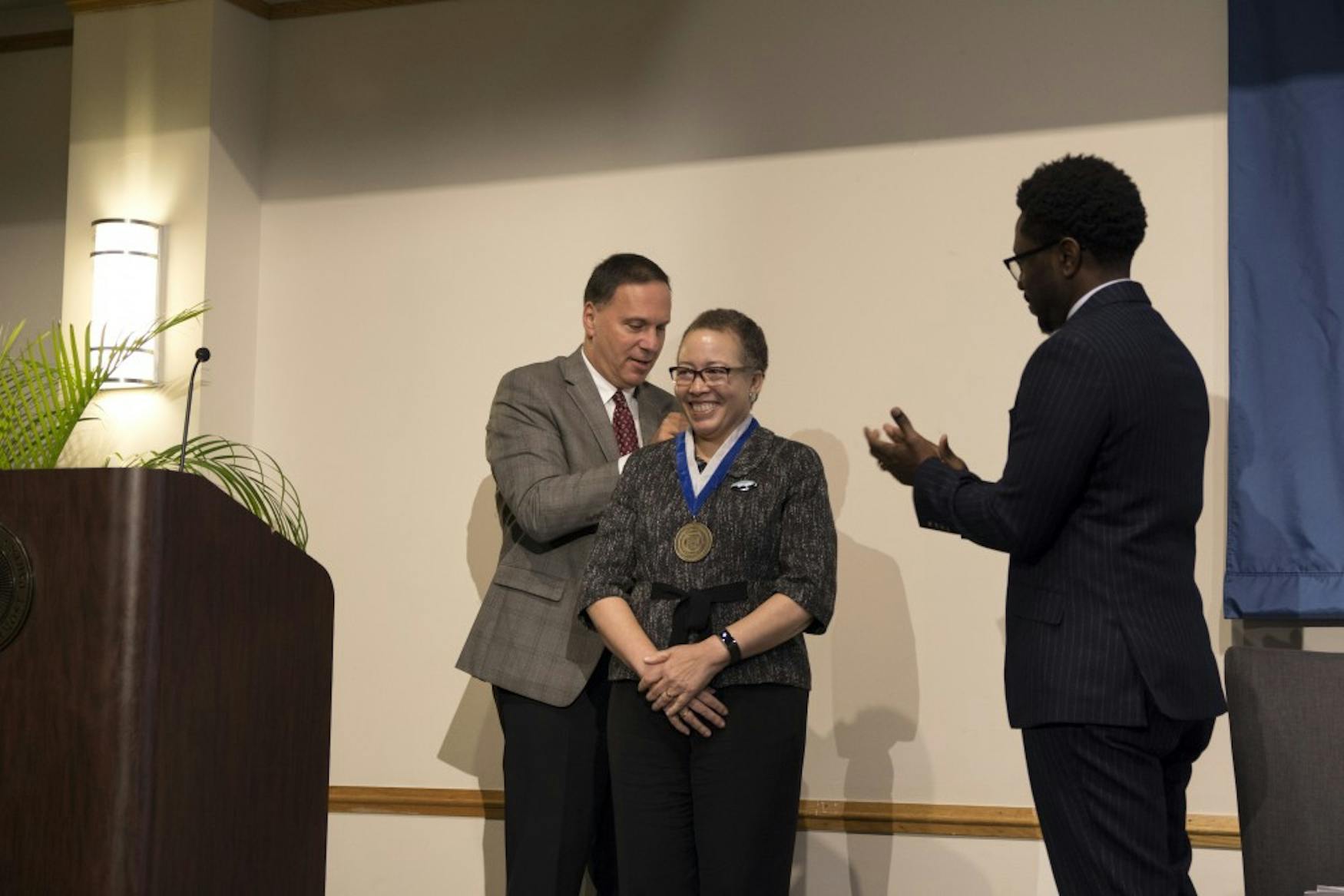Scholar of race relations receives $25,000 Gittler Prize
On Oct. 3, University President Ronald Liebowitz presented Dr. Beverly Tatum with the 2018 Gittler Prize, which recognizes outstanding scholarly work on racial, ethnic and religious relations. According to Liebowitz’s introductory remarks, the members of the Gittler prize selection committee described Tatum’s work as “brilliant, elegant, insightful, unpretentious — a model for all in the academy.”
Prof. Derron Wallace (SOC), a member of the selection committee, listed Tatum’s qualifications as he introduced her as the winner. He explained that Tatum has written three books but is best known for “‘Why Are All the Black Kids Sitting Together in the Cafeteria?’: And Other Conversations About Race,” which was named the multicultural book of the year by the National Association for Multicultural Education in 1998. “I believe this should be University-wide reading for all of us here at Brandeis,” he said.
Recipients of the Gittler Prize receive $25,000 and a medal. To guide her speech, Tatum looked to the doctrine of Dr. Martin Luther King Jr. to better understand how facilitating dialogue between different groups can help close the “empathy gap” between them.
Tatum explained that American public schools were actually less segregated in 1980 than they are now. More specifically, 75% of Black students attend “majority minority schools” where over 60 percent of their classmates live in poverty. According to Tatum, “the result is…that young people are growing up in racially divided communities and are almost as separated from each other … as they were 50 years ago.” Tatum explains that with no interaction or knowledge of each other’s life experiences, no genuine empathetic relationships between whites and people of color can exist. This is the empathy gap.
According to Tatum, another factor hindering interracial dialogue is the homogeneity of American social networks.
Tatum also elaborated on exactly what needs to be discussed in cross-group conversations. She explained that less well-known aspects of the history of racism should be touched upon in productive dialogue. For instance, she mentioned that Georgetown University was funded by the sale of slaves. Knowledge of a fact like this can change one’s attitudes toward race. The most important part of cross-group dialogue is knowledge, according to Tatum. Unless racial groups have knowledge of each other’s current and historical conditions, she said, they cannot have empathy for each other.
Dr. Tatum expressed hope that interracial dialogue will become more prevalent. She cited programs such as the University of Michigan Intergroup Relations Program and foundations such as the Kellogg Foundation that have committed themselves to promoting interracial dialogue throughout the country. In the IGR program, she explained, students take courses “carefully designed to engage students in careful listening and shared explorations of the meanings of social identities, conflict, community, and social justice in those contexts.”
According to Tatum, there is research evidence that dialogues like those facilitated by the IGR program are effective in bridging the empathy gap between races. These programs change the attitudes and behaviors of both white students and students of color for the better, Tatum said. Students involved in the programs had “increased self-awareness about issues of power and privilege, greater awareness of the institutionalization of race and racism in the United States, better cross-racial interactions, less fear of race-related conflict and greater participation in social change.”
Tatum addresses the counterargument — that discussions about race only create tensions where none previously existed. Tatum believes that silencing conversations on race and racism “is just another way to maintain the status quo. You can’t solve a problem without talking about it.”
Finally, Tatum reiterated her main point: “We can allow the forces leading to greater segregation to drive us further apart as a nation, or we can use our leadership as active citizens to engage one another in the work of building community across lines of difference.” She shared a quote from Dr. King: “Racial understanding is not something that we find, but something that we must create.”
Tatum ended by praising the Brandeis motto: “Truth even unto its innermost parts.”
“That’s exactly what I’m talking about,” she said. “We need to explore truth even unto its innermost parts, even the parts that don’t feel right.” She explained that our motto can guide our faculty toward representing diversity on campus. She said that “If we only talk about the experience of white middle class” people, we are not exploring “truth unto its innermost parts.”



Please note All comments are eligible for publication in The Justice.